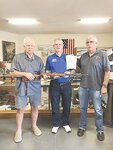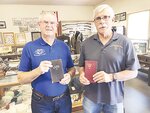WHEATLAND – Two Wheatland attorneys made a donation to the Laramie Peak Musuem last week that represents a tragic event in the town’s history, and marked milestones for the state. Rex …
This item is available in full to subscribers.
To continue reading, you will need to either log in to your subscriber account, below, or purchase a new subscription.
Please log in to continue |



WHEATLAND – Two Wheatland attorneys made a donation to the Laramie Peak Musuem last week that represents a tragic event in the town’s history, and marked milestones for the state. Rex Johnson and Steve Sherard have jointly owned the rifle used by “Tricky” Riggle in an unfortunate lover’s quarrel, in which two people were murdered and Riggle spent the rest of his life in prison. Don Sherard, Steve’s father, was Riggle’s defense attorney.
Herschel Clay “Tricky” Riggle was convicted of two counts of premeditated murder in December 1953, and after a failed appeal in July 1956, was to be executed by gas chamber on Sept. 5, 1956. The governor at the time, Milward Simpson, had on principle opposed the death penalty and gave Riggle an 11th hour stay of execution. He remained in prison in the Wyoming State Hospital in Evanston until his death on Oct. 6, 1981.
Mental illness from severe head injuries could have been contributing factors to the tragedy. Riggle was born Dec. 20, 1900 in Woodbine Iowa, and just before he graduated, moved to Wyoming where he rodeoed for 20 years. He specialized in trick roping, hence his nickname, but also suffered multiple head injuries over the years, including being thrown from a steer, bucking bronco, brahma bull, falling off a scaffold and falling out of a train car. The injuries caused him to suffer total amnesia for several days at a time, forgetfulness, irritability, and awkwardness.
During one session of recorded testimony, Riggle said he “blacked out” after seeing his quasi-girlfriend/fiancé laughing with another man. It was after that point he retrieved a .22 rifle from his car and shot both of them multiple times before running from the Angle Café’s lunchroom. A posse was organized to search for him. The search was reported to be the first use of the state’s two-way radio system, as the search went beyond the county since Riggle had said to witnesses he was planning to go to Lusk to marry his girlfriend – whom he had just murdered.
Anyone interested in seeing the key piece of evidence in the Riggle case, or more information about the history it represents, can see it for themselves at Laramie Peak Museum on 16th Street in Wheatland.